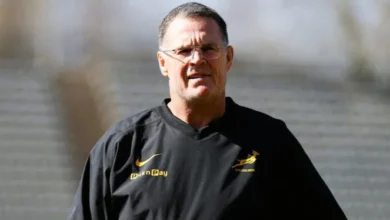Five Powerful Themes: Newly Elected World Rugby Chairman Brett Robinson Vows to Lawfully Reform, Innovate and Unify all Difference Factions

News: Newly elected World Rugby Chairman Brett Robinson said it was a ‘proud moment’ for him after becoming the first in his position from the southern hemisphere on Thursday, and vowed to unify all the different factions
The 54-year-old former Australia loose forward succeeds England’s Bill Beaumont who steps down after eight years.
Robinson obtained 27 votes with former French international Abdelatif Benazzi receiving 25 in the second round of World Rugby Council voting.
Italy’s Andrea Rinaldo bowed out in the first round with nine votes.
“It is a great privilege, it is a game I have been close to all my life,” said Robinson at a press conference.
“It is a proud moment. I would like to recognise Bill Beaumont for his eight years of leadership.”
Robinson’s four year tenure comes with the option to run for a second, and said his job was to be a unifying force.
Argentinian Agustin Pichot, who is highly regarded by many as a force for real change, was furious after failing to be elected to the executive board.
“It’s a British game. An English win,” he said.
Robinson offered a fig leaf.
“We’ve got differences of opinion,” he said.
“We’ve got some challenges, and there’ll be some people that were disappointed after the election.
“It’s really important that in my role, that I bring the game together and we agree on what shared success looks like, and we pursue it together.
“Because as a game, we know the teams that are the most united are the most powerful.”
Robinson, who is a doctor specialising in orthopedics, said he had five main themes he wanted to deliver on.
These include financial sustainability “across all member unions amid a rising cost base and wage inflation” and “fan and player growth through investment in player safety, law reform and innovation”.
World Rugby are investing £40 million ($51 million) in the next few years including instrumented mouthguards for all global competitions.
“John [Jonathan Webb the new vice-president] and I, are both clinicians,” said Robinson.
“So healthcare is at the heart of our personal purpose.
“So we are both incredibly passionate about the game, but also passionate about creating an environment where players are safe.”
Robinson has helped lead concussion research at the University of Queensland.
“We want it to be safe, and we want to do all we can to make sure that young boys and girls and mums and dads feel safe in playing this great game, because there’s so much more to offer,” he said.
Webb, a former England international, said the ‘machismo’ had gone out of rugby.
He recounted how he was struck in games last weekend that there were instances where opposing players told the match official to stop the game because an opponent was injured.
Since his retirement from playing, Robinson bas enjoyed spell in business and views the annual Nations Cup as priority to enhance the sport’s income, which is under great strain.
He was bitterly disappointed when his idea was rejected in 2019, but it is slated to have its inaugural outing in 2026.
There will be a northern pool, made up of the Six Nations, and a southern pool, with Japan and Fiji expected to join the four existing Rugby Championship nations – South Africa, New Zealand, Australia and Argentina.
There will be a second division of a dozen countries with promotion and relegation from 2030.
“I’m really excited,” said Robinson.
“There’s been some frustration in the Nations Championship not getting off the ground the last time.
“But it was a monumental decision in November last year at the World Cup finally, after probably 30 years, for us to agree on this, on this meaningful annual calendar that we would play twice in every cycle.
“It’s probably one of the most significant things that we’ve been able to achieve in my time in rugby.”
Robinson has also been a proponent of speeding up the game, including time limits on setting scrums and lineouts.
“We have increased ball and play time by over three minutes by introducing some of those changes,” said Robinson.
“There’s still some things that are frustrating us, but that’s a massive improvement.”1



